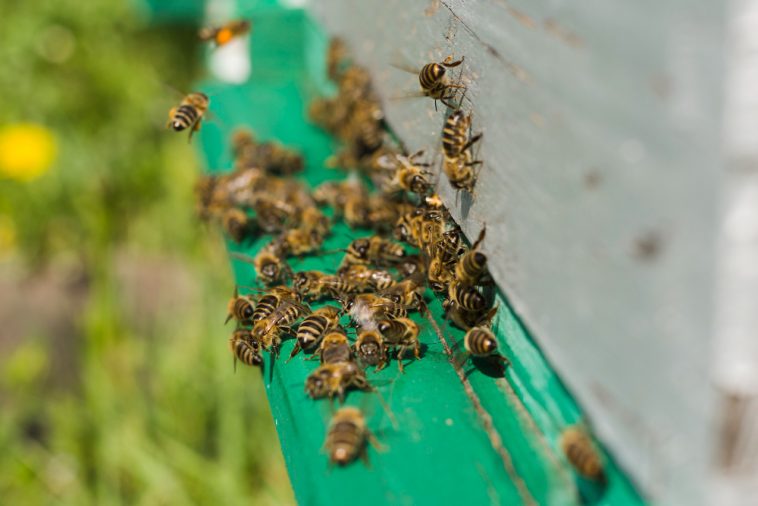Bees are vital pollinators in our ecosystem, but it can be concerning when they nest on your property. If you’re worried about safety, especially for allergic family members or pets, this guide will help prevent bee nesting. Discover expert strategies to deter bees effectively and embark on this insightful journey!
Understand the Importance of Bee Conservation:
Understanding the importance of bee conservation is crucial before we discuss preventive measures. Bees are critical for pollinating plants, resulting in the production of essential crops. Therefore, it’s essential to approach bee prevention carefully, ensuring we protect them while safeguarding our property.
- Identify Potential Nesting Sites:
Identify potential nesting sites to prevent bees from nesting on your property, as bees are attracted to specific areas. Understanding their preferences will assist you in effectively addressing these areas.
- Hollow Trees or Logs: Bees naturally seek out hollow spaces in trees or logs to build their nests. Inspect any existing hollow structures on your property and take appropriate action if bees have already taken residence.
- Wall Cavities: Bees can enter wall cavities through cracks and gaps, establishing nests inside your home. Regularly inspect the exterior of your property for any potential entry points and seal them off promptly.
- Ground Nesting: Some bee species, such as bumblebees, prefer to nest in the ground. Keep an eye out for signs of ground nesting, such as bees buzzing close to the ground or digging activity near your lawn or garden.
- Implement Preventive Measures:
Now that you’ve identified potential nesting sites explore effective preventive measures to discourage bees from settling on your property.
- Remove Attractive Food Sources: Bees are drawn to sweet smells and floral scents. Keep trash cans tightly sealed, promptly clean up spills or food residues, and ensure garbage bins are located away from common areas to reduce bee attraction.
- Minimize Standing Water: Bees need water to survive, so eliminating standing water sources can discourage them from nesting on your property. Regularly empty and clean birdbaths, pet water bowls, and other containers that collect water.
- Plant Bee-Unfriendly Flora: While supporting bee conservation is essential, strategically planting bee-unfriendly flora can divert their attention from your property. Opt for plants less attractive to bees, such as marigolds, geraniums, or ferns, instead of bee-favorite flowers like lavender or sunflowers.
- Seal Potential Nesting Sites: Seal off any potential nesting sites on your property, such as tree cavities, wall cracks, or gaps in your foundation. Use caulk or weatherstripping to close these openings and prevent bees from accessing these areas.
- Install Bee Traps or Repellents: If you’re dealing with persistent bee activity, consider installing bee traps or repellents. Bee traps are designed to attract and capture bees safely. At the same time, repellents emit scents that deter bees from nesting in the vicinity.
- Seek Professional Assistance:
In some cases, bee prevention measures may not suffice, or you may encounter a bee nest that requires professional attention. In such situations, it’s crucial to seek the assistance of a reputable bee exterminator. If you’re in Maryland, find a specialized bee exterminator Maryland who can safely remove bee nests without harming the bees and relocate them to ensure their survival. They use specialized equipment and techniques to eliminate risks associated with having a bee nest on your property.
When choosing a bee exterminator, consider the following:
- Experience and Expertise: Look for a bee exterminator with extensive experience in bee removal. They should know about different bee species and the appropriate removal methods.
- Reputation and Reviews: Check online reviews and testimonials to gauge the reputation of the bee exterminator. Look for positive feedback regarding their professionalism, effectiveness, and humane approach to bee removal.
- Licensing and Insurance: Ensure the bee exterminator has the necessary licenses and insurance to operate in your area. This will protect you from any liability in case of accidents or damages during the removal process.
- Eco-Friendly Practices: Opt for a bee exterminator who adopts eco-friendly practices, such as relocating the bees rather than exterminating them. This demonstrates their commitment to bee conservation while addressing your concerns.
Conclusion:
Preventing bees from nesting on your property requires a combination of proactive measures, understanding their behavior, and, when necessary, seeking professional assistance. By identifying potential nesting sites, implementing preventive measures, and considering the importance of bee conservation, you can create an environment that discourages bees from settling on your property.
Remember to remove attractive food sources, minimize standing water, plant bee-unfriendly flora, seal potential nesting sites, and consider the installation of bee traps or repellents. If you face ongoing bee activity or a risky nest, contact a reliable bee exterminator for safe removal and relocation. By doing so, you can protect your property while supporting bee conservation. Remember, it’s possible to prevent nesting while ensuring their well-being.




